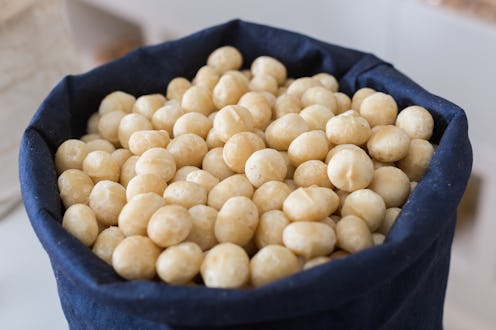News
Don't Get The Macadamia Nuts At Whole Foods
If you've purchased macadamia nuts recently, you might want to hold off on baking those cookies. Macadamia nuts were just recalled in six states — Alabama, Georgia, Mississippi, North Carolina, South Carolina, and Tennessee — for fear of possible salmonella contamination. The nuts had been distributed to Whole Foods Market, Harry's Farmers Market, and Greenlife Grocery stores in those states. Following the recall, the FDA is now issuing detailed information to help consumers avoid becoming ill and obtain a full refund.
If you live in one of the aforementioned states and recently purchased raw macadamia nuts, the FDA urges you to check the label for the following information:
- The product name is Whole Foods Market Raw Macadamia Nuts
- The nuts were packaged in 5.6 oz. plastic tubs
- The package lists sell-by dates of 4/22/15, 5/4/15, and 5/6/15
- The package lists a UPC code of 7-23055-21415-3
If you purchased macadamia nuts from this potentially contaminated batch, you can return them to Whole Foods, Harry's Farmers Market, and Greenlife Grocery with a receipt to get a full refund. For any questions, consumers can call Whole Foods Market Customer Service at 512-477-5566, ext. 20060, Monday through Friday 9:00 a.m. to 5:00 p.m. CDT.
Luckily, the FDA has not reported any illnesses thus far stemming from the nuts. The agency revealed in a press release that during routine testing by an FDA-contracted lab, the raw macadamia nuts tested positive for salmonella.
Most people's knowledge of Salmonella might come from their moms warning them against eating raw cookie dough, but here's an important refresher course for you.
Salmonella is a bacteria that can contaminate food items and cause food poisoning if one consumes the affected product. Contamination can happen in many ways, including during food processing and handling (if a food handler does not wash his or her hands properly), through the feces of house pets, and it can also be carried by small rodents and reptiles. The food items that are most likely to be contaminated with Salmonella are beef, poultry, milk, and eggs, although vegetables are also susceptible.
If you're not sure whether you've contracted salmonella-induced food poisoning, some symptoms to look out for include diarrhea, stomach pains, and fever. These symptoms usually emerge 12 to 72 hours after infection and can last four to seven days. Most healthy adults will recover without treatment, but older individuals, children, infants, and adults with impaired immune systems should seek medical help.
According to the CDC, salmonella is estimated to cause 1.2 million illnesses in the U.S. every year. Roughly 19,000 people require hospitalization and 380 people die from the disease annually. In other words, it's no laughing matter. Be sure to pay close attention to any recalls that apply to your area.
